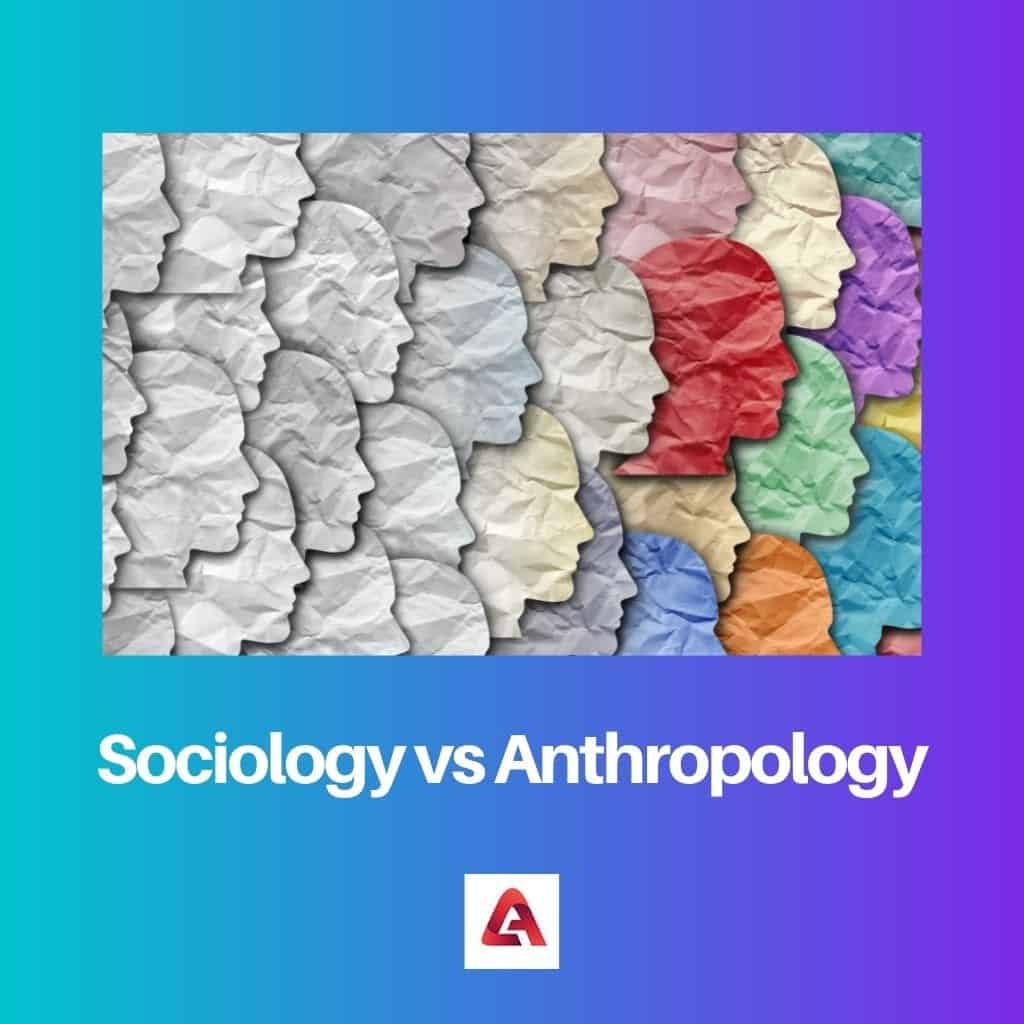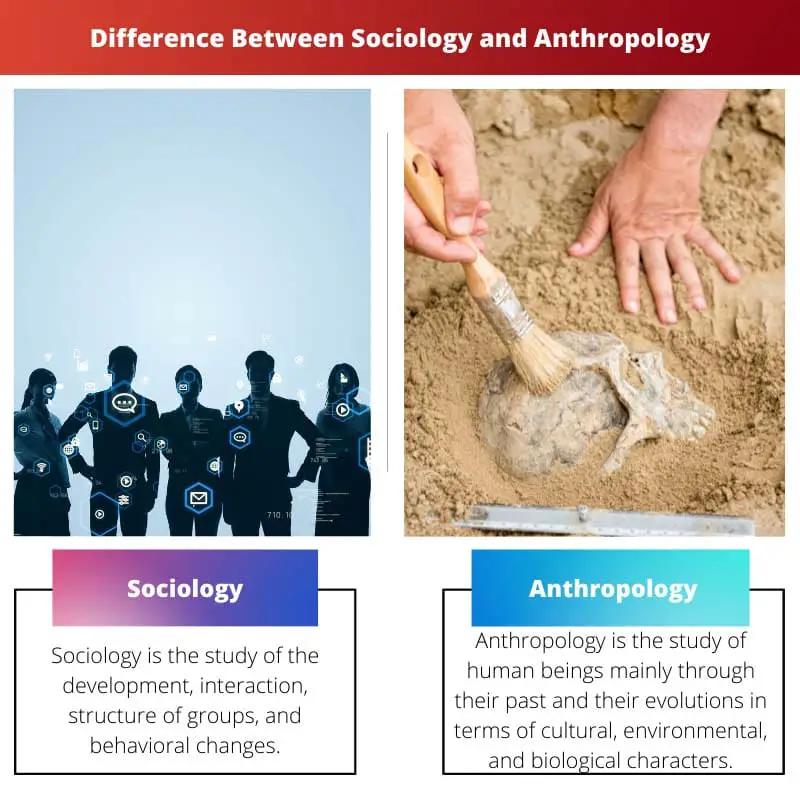Sociology examines the structures and dynamics of human societies, focusing on social relationships, institutions, and collective behavior within a broader context. Anthropology, on the other hand, explores the diversity of human cultures, traditions, and beliefs across time and space, often through immersive fieldwork and comparative analysis.
Key Takeaways
- Sociology studies human societies, social behavior, and institutions, focusing on group dynamics, social structures, and cultural norms; anthropology is the study of human beings and their cultures, with a broader scope that includes biological, cultural, linguistic, and archaeological perspectives.
- Sociology primarily investigates contemporary social issues and patterns in modern societies; anthropology encompasses the study of human evolution, cultural diversity, and historical development.
- Although both disciplines explore human behavior and social patterns, sociology emphasizes social systems and structures, while anthropology takes a holistic approach, examining humans and their cultures from multiple perspectives.
Sociology vs Anthropology
Sociology is related to the study of social behavior of people. Study of social issues is also included in sociology. It also defines how people interact with each other in a society. The study of human living style is called anthropology. The study of culture is also included in anthropology. Anthropology also focuses on how people adapt to environmental changes.

Sociology deals with the study of humans’ social relationships with societies and institutions. At the same time, anthropology is the study of human beings’ past, present, and future to analyze various cultural differences that have evolved over the years.
The social nature of man forms the basis of sociology. It includes investigating the structure of groups of people, societies, their behavioural patterns, and understanding how people interact. At the same time, anthropology focuses more on areas like culture, archaeology, language, and biology that have been evolving.
Comparison Table
| Feature | Sociology | Anthropology |
|---|---|---|
| Focus | Social structures and institutions within a society | Humanity and culture across time and space |
| Level of Analysis | Macro-level: Focuses on large-scale social phenomena (e.g., social class, gender inequality, social movements) | Micro-level: Examines individual experiences and behavior within cultural contexts |
| Research Methods | Primarily relies on quantitative methods (surveys, statistics) and qualitative methods (interviews, observations) | Employs a wide range of qualitative methods (participant observation, ethnography) and increasingly, quantitative methods |
| Subfields | Criminology, social stratification, social psychology, education, family studies | Cultural anthropology, archaeology, linguistic anthropology, medical anthropology, urban anthropology |
| Key Questions | “How do social structures and institutions influence individual behavior and social change?” | “How do humans create and share culture across different societies and historical periods?” |
| Examples of study | The impact of social media on social movements, the relationship between education and social mobility, the role of family in shaping individual identity | Understanding rituals and belief systems in diverse cultures, analyzing the impact of globalization on indigenous communities, studying language and communication patterns across societies |
What is Sociology?
Key Areas of Focus in Sociology
Sociology encompasses a vast array of subfields that further explore different aspects of human society. Here are some prominent areas of focus:
Social Stratification and Inequality
This subfield examines the unequal distribution of resources, power, and prestige within societies. It analyzes how social class, race, gender, and other factors contribute to social stratification and its consequences.
Social Institutions
Sociologists study how major social institutions like family, education, religion, economy, and government shape individual and societal behavior. They analyze the functions, structures, and evolution of these institutions.
Culture and Socialization
This area explores the concept of culture, including shared beliefs, values, norms, and practices that shape individual and group behavior. It also examines socialization, the process by which individuals learn the culture of their society.
Social Change and Development
This subfield investigates the dynamic nature of societies and the various factors that drive social change. It analyzes historical and contemporary trends in areas like urbanization, globalization, and technological advancement.
Deviance and Social Control
Sociologists study deviant behavior (actions that violate social norms) and social control mechanisms (formal and informal) that maintain order within societies.
Why Study Sociology?
Sociology equips us with the critical thinking skills to analyze the world around us. It helps us understand:
- The reasons behind social issues like poverty, crime, and discrimination.
- The impact of social structures and institutions on our everyday lives.
- The dynamics of social change and how we can participate in positive change.
- Different cultures and perspectives, fostering greater empathy and intercultural understanding.

What is Anthropology?
Subfields and Specializations
Anthropology comprises several subfields, each focusing on distinct aspects of human life and society:
- Cultural Anthropology: Cultural anthropologists study the beliefs, practices, customs, and social structures of contemporary and historical societies. Through immersive fieldwork and participant observation, they seek to understand the intricacies of culture and social organization.
- Biological Anthropology: Also known as physical anthropology, this subfield examines the biological evolution, variation, and behavior of humans and their primate relatives. Biological anthropologists investigate topics such as genetics, human adaptation, skeletal biology, and primatology.
- Linguistic Anthropology: Linguistic anthropologists explore the role of language in human societies, focusing on language diversity, communication patterns, and the relationship between language and culture. They study language structure, discourse, and the ways in which language shapes social identities and interactions.
- Archaeology: Archaeologists investigate past human societies through the analysis of material remains, artifacts, and environmental data. They reconstruct ancient cultures, economies, and lifeways, shedding light on the origins of human civilization and the development of technologies, economies, and social institutions.
Core Concepts and Theories
Anthropology is guided by key concepts and theoretical frameworks that help explain human behavior, cultural practices, and social dynamics:
- Cultural Relativism: Anthropologists approach cultural phenomena without judgment, seeking to understand them within their own cultural contexts rather than imposing external standards.
- Ethnography: Ethnographic research involves immersive fieldwork, where anthropologists live among and observe the communities they study to gain deep insights into their cultures and social structures.
- Evolutionary Theory: Anthropologists draw on evolutionary theory to understand the biological and cultural development of humans and their ancestors, exploring processes such as natural selection, adaptation, and cultural evolution.
- Symbolic Anthropology: This theoretical approach examines the role of symbols, rituals, and meaning-making in shaping human behavior and social life, emphasizing the cultural significance of symbols and rituals in different societies.
Application and Impact
Anthropology has diverse applications and influences across various domains:
- Cross-Cultural Understanding: Anthropological insights promote cross-cultural understanding and appreciation, fostering tolerance and respect for cultural diversity.
- Development and Policy: Anthropological research informs development initiatives, policies, and interventions by providing insights into local contexts, social dynamics, and community needs.
- Heritage Conservation: Archaeological research contributes to heritage conservation efforts by documenting and preserving archaeological sites and cultural artifacts, safeguarding humanity’s cultural heritage.
- Globalization Studies: Anthropologists study the impact of globalization on societies and cultures, examining processes such as migration, cultural exchange, and social change in a globalized world.

Main Differences Between Sociology and Anthropology
- Scope of Study:
- Sociology primarily focuses on the study of human societies, social institutions, and collective behavior within a broader societal context.
- Anthropology encompasses the study of both human societies and cultures, examining cultural diversity, human evolution, and social practices across time and space.
- Approaches and Methods:
- Sociology often employs quantitative methods such as surveys, statistical analysis, and experiments to study social phenomena.
- Anthropology frequently utilizes qualitative methods like ethnography, participant observation, and in-depth interviews to understand cultural practices and social structures within specific communities.
- Focus on Scale and Context:
- Sociology tends to analyze societal patterns, structures, and dynamics at a macro-level, exploring issues such as social inequality, power relations, and social institutions.
- Anthropology often emphasizes the micro-level examination of cultural practices, social norms, and interpersonal relationships within specific cultural contexts, including small-scale communities and indigenous societies.

- https://psycnet.apa.org/record/2006-21619-002
- https://digitalcommons.fairfield.edu/sociologyandanthropology-books/15/
- https://www.ingentaconnect.com/content/cog/ta/2005/00000010/00000001/art00002

The detailed explanation of the study areas and historical basis of sociology has deepened my appreciation for the subject. It’s fascinating to delve into the societal underpinnings of human behavior.
I couldn’t agree more, Lucy! The article’s emphasis on historical context and subject matter is enlightening and engaging.
The detailed comparison between Sociology and Anthropology is quite enlightening. Understanding the differences and similarities between the two disciplines broadens my perspective of human behavior and societal structure.
I totally agree, Mia! It’s fascinating to learn how each discipline approaches the study of human behavior and cultures!
I found the historical context of sociology and key contributions from famous sociologists very compelling. It adds a rich layer of understanding to the subject.
The comparison between the focus levels of sociology and anthropology provides valuable insights into the macro and micro perspectives of studying human behavior. An intellectually stimulating read!
Indeed, a thought-provoking comparison! The contrast between macro and micro-level analyses enhances the depth of understanding.
Absolutely, Schapman! The distinct analytical lenses of sociology and anthropology offer diverse viewpoints on human social dynamics and cultural evolution.
The comprehensive overview of sociology and anthropology, including their historical origins, study areas, and methodological differences, offers a compelling exploration of the two disciplines. An insightful read!
Absolutely, Lily96! The thorough examination of these fields provides a rich understanding of human societal behavior.
Indeed! The article offers an intellectually stimulating analysis of sociology and anthropology, elucidating their distinct approaches to the study of human society.
The comparison table provides a concise and clear overview of the differences between Sociology and Anthropology. It’s a great reference for understanding the core areas of study in both disciplines.
Absolutely, Kieran! The detailed breakdown of methodology and focus level has given me a deeper understanding of these fields of study.
The emphasis on sociology’s focus areas such as families, health, communities, and gender showcases the breadth of subjects under sociological study, making it an intellectually diverse field.
Absolutely! The scope of sociological study spans across an array of social elements, contributing to a comprehensive understanding of societal dynamics.
Well said, Pmorgan! The multifaceted nature of sociology is truly captivating, offering insights into various dimensions of human society.
The details about the foundational sociological contributions by prominent figures highlight the evolution of sociology as a professional and academic subject, enriching my knowledge about its historical development.
I wholeheartedly agree, Tsaunders! The article’s focus on historical context and influential sociologists is truly illuminating.
The historical roots and significant sociological contributions discussed in this article shed light on the evolution and development of sociology as an academic subject. Truly fascinating!
The focus on the interactive actions of people within society, as discussed in sociology, resonates with the core essence of human social dynamics. A compelling exploration of society’s intricacies!
I share your sentiments, Isabelle! The article offers a profound look into the interplay of human interactions and societal structures.
Absolutely! The sociological lens exposes the interconnectedness of human actions and social constructs, providing a holistic perspective.
The article provides a comprehensive understanding of sociology and anthropology, considering their areas of study, popularity, and methodology. The nuanced exploration of these disciplines is thought-provoking.
Absolutely! The article captures the essence of sociology and anthropology impeccably, offering rich insights into their distinctions and core principles.
Agreed, Selina! It’s refreshing to see such a detailed and insightful comparison between these two intriguing fields.